Humanities & Social Sciences
ICGSA 2022 Sets the Pace for Re-Imagining Future of Gender Studies
Published
4 years agoon
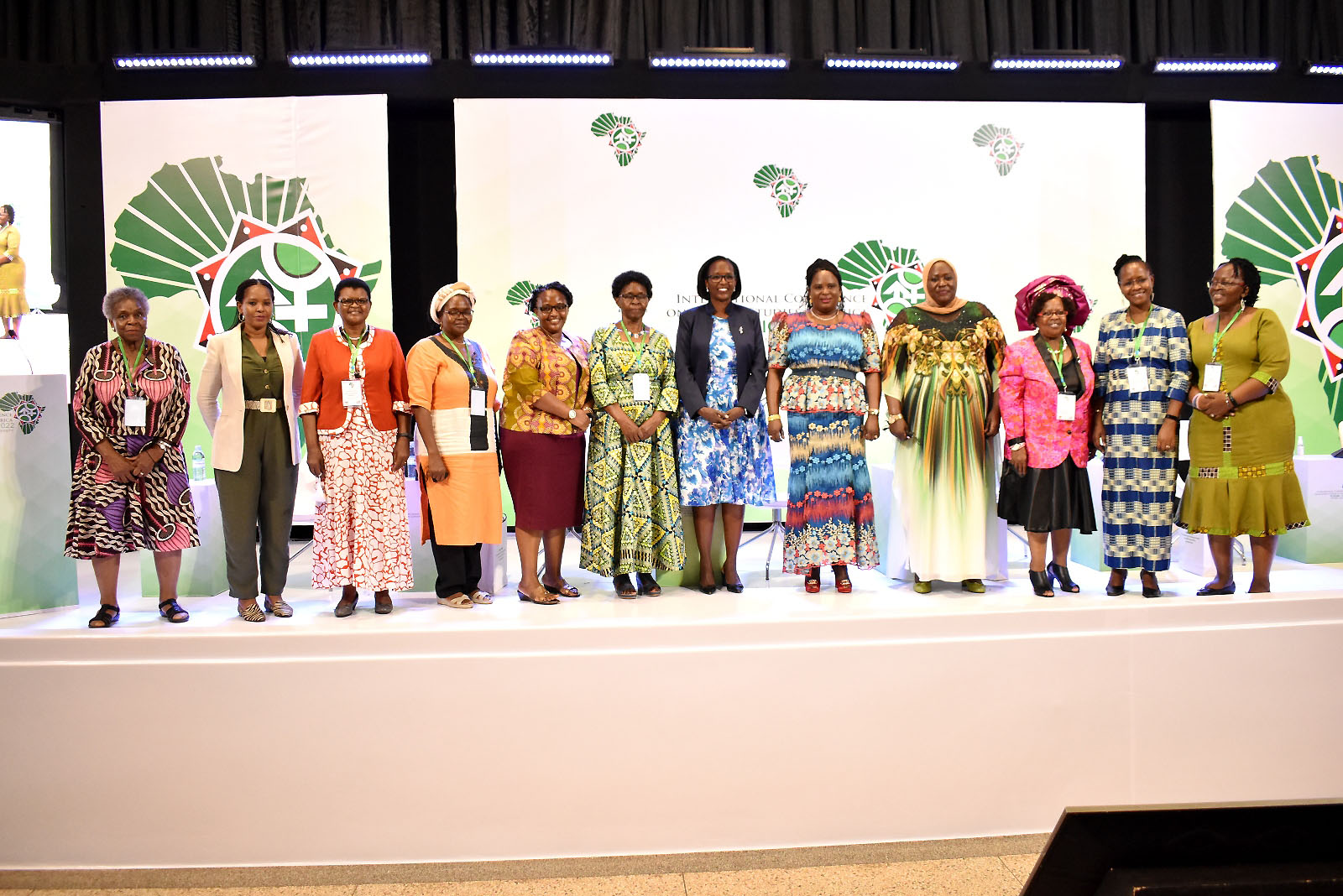
The International Conference on Gender Studies in Africa (ICGSA) closed on a high note on Friday 25th February, 2022 with resolutions on how to champion Gender Studies on the African continent. These called for the need to; theorise from the African context, network across the academia at local level, teach better, conduct more research and mentorship, as well as network more between academia and the field of practice in Africa and internationally.
“Networking across the academy on the continent is very important” emphasised Assoc. Prof. Sarah Ssali, the Dean, School of Women and Gender Studies (SWGS), Makerere University. “We have been able to inspire many other gender units to come up on the African continent; the current one being worked on is with the University of Nigeria, Nsukka, which is being spearheaded by Dr. Tabitha Mulyampiti,” she added.
Other resolutions shared by Assoc. Prof. Ssali included the need to build a community of practice comprised of teachers and practitioners at the continental level as well as document and archive more in order to build memories.
“This is one of the things that is lacking heavily in Africa not just in Gender Studies but all over; we are constantly researching because we don’t know what those before us did. This creates a problem in that the memories become fractured,” she explained.
To help galvanise all these aspirations, ICGSA 2022 resolved to establish a Pan-African feminist network for Women and Gender Studies. “This is supposed to be a platform that is going to bring together the 500+ Gender Scholars and those yet to come, to build a better community of practice, academia and take the discipline further” Assoc. Prof. Ssali added.
The resolutions shared by the Dean tied in nicely with those of fellow panelist Prof. Shefer Tamara, Director of Women’s and Gender Studies at the University of the Western Cape (UWC), South Africa, as well as those of Prof. Joy Kwesiga, Vice Chancellor, Kabale University who chaired the Fifth and final Plenary Panel on The Future of Gender Studies in Africa.
Prof. Kwesiga in her presentation themed The Door is only Ajar made a few propositions to help Gender Studies Open the Door Fully, and Enter the Corridors of Power and Equity. These included;
- The need to acknowledge that Gender Studies are varied and their enhancement require both general and specific interventions.
- Curriculum reviews that emphasise transformatory areas (e.g. masculinity) are urgently required.
- The need to record and know our history: it underpins our cultural norms and practices, and informs us about the origins of gender inequality in our specific environment.
- Form networks along interests and specialties (education, health, economics, training, etc), regionally and even on linguistic basis.
- Learn from experience of the 1995 Beijing International Conference on Women – a stimulant to Gender Studies and birth of many organisations that promote gender equality.
Prof. Tamara in her reiteration critically observed that “Imagining future possibilities requires working with our pasts, especially those that continue to haunt us in the present.” These, she noted, include neoliberal capitalism and its consumerist universities, “where critical feminist scholarship only matters when it is packaged in particular ways and proliferates particular kinds of outputs. “
She called for the need to decolonise the curriculum by adopting alternative approaches to the classroom such as emphasis on non-didactic, collaborative, participatory, embodied, relational and affective feminist practices, as well as the value of working across modalities of art, activism and scholarship in both pedagogical and research practices, as key terrains of possibility on the way forward.
Citing the keynote address delivered by Prof. Amina Mama on the opening day of the conference, Prof. Tamara said, “We cannot simply acknowledge that we emerged from feminist grassroots movements, but we need to make sure that these connections are vibrant and alive.
“We need to be consistently reviving and reinvigorating these synergies, as she put it, between civil society movements and the scholarly projects, which of course means ongoing collaborations and networking” emphasised Prof. Tamara.
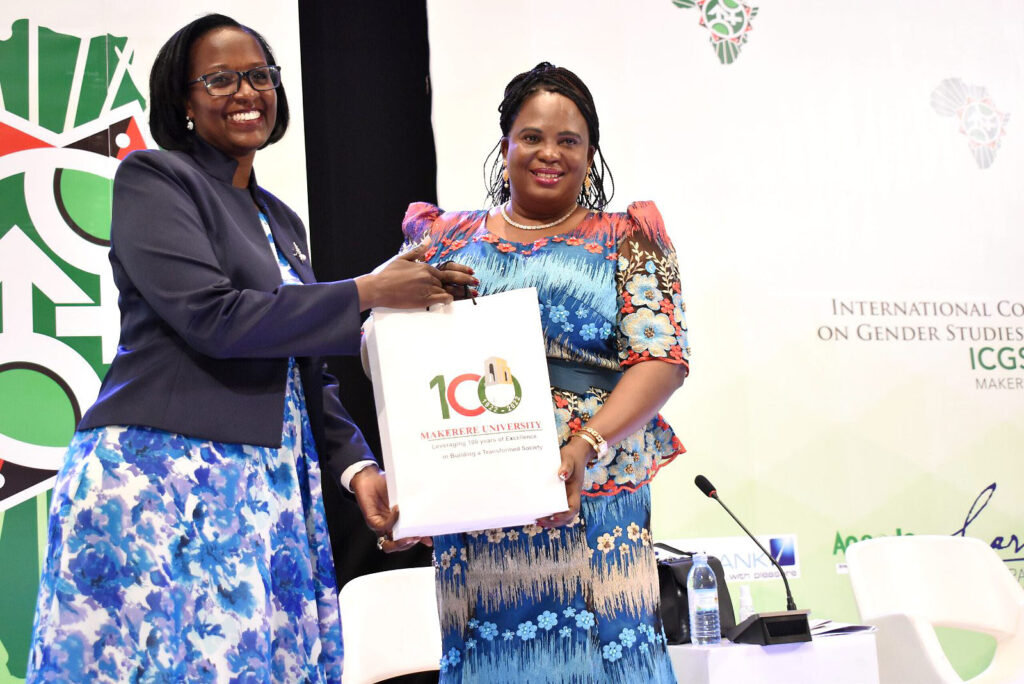
Delivering her remarks at close the conference, the Chairperson of Council, Mrs. Lorna Magara thanked the Vice Chancellor, Prof. Barnabas Nawangwe, Principal College of Humanities and Social Sciences (CHUSS), Assoc. Prof. Josephine Ahikire, Dean SWGS Assoc. Prof. Sarah Ssali, as well as the faculty, staff and volunteers for the excellently organised and well-facilitated conference.
“I am delighted to note that in addition to my expectations being met, I had, in the few sessions I attended, the rare opportunity to hear firsthand, the accounts of the brave heroines of Afro-feminism and how important these accounts are for shaping future mindsets” remarked Mrs. Magara.
The Chairperson of Council nevertheless cautioned that in addition to decolonising the African academy, the debate should be blended with a candid discussion on the application of African scholarship to the needs and aspirations of African communities.
“The debate must go beyond the goal of accommodating the voices of African scholars in academia. The academy must provide space for indigenous knowledge, sharing local experiences, and prioritising discourse on African problems from African lenses” she noted.
The closing keynote address was delivered by Dr. Nyepudzayi Mercy Nyangulu, Founder and Chair, of the Women in Management Business and Development (WIMBD) TRUST of Zimbabwe, which coincidentally marks 30 years of existence on 27th October, 2022. On this celebratory note, Dr. Nyangulu proposed the following as recommendations to SWGS for the next 30 years.
- Leverage the rich list of SWGS alumni to influence Government Ministries as well as Higher Education Institutions to include a gender component in their curricula.
- Develop programs that can enhance collaboration, solidarity and sharing of experiences with Women’s Movements so as to strengthen needs assessment and data collection at the grassroots.
- Take advantage of e-learning to reach those in full-time employment with the aspirations of upgrading their qualifications in leadership and management
- Adopt community dialogues as a mechanism for learning more about gender-related issues such as child marriages and Gender Based Violence.
- Adopt gender programmes that encourage inter-generational learning and knowledge sharing
- Explore opening up SWGS Centres in other African countries as an income generating activity.
- Collaborate with National Gender Commissions to bring theory and practice together and develop new theories for Gender Praxis.
- Tap into the debate on masculinity that is gaining momentum so as to develop relevant programmes and grow the number of male champions
- Think outside the box, dream big and turn all the challenges afflicting gender studies into opportunities
- Follow up past students and their impact on society and use data findings to inform future programmes
- Broaden funding base by; going beyond development partners to institutions such as the African Union (AU) that have Ambassadorial positions e.g. in Child Marriages, Offering consultancy services to Countries as SWGS, etc.
The Guest of Honour at the closing ceremony and Minister of Gender Labour and Social Development, Hon. Betty Amongi Akena, who was accompanied by the Chairperson of the National Women’s Council (Uganda), Hajat Faridah Kibowa in her speech congratulated Makerere University upon successfully hosting the conference whose recommendations will inform policy.
Hon. Amongi Akena, a double alumna of the Bachelor of Political Science and Public Administration and Masters of International Relations and Diplomatic Studies commended her alma mater for pursuing a broad gender agenda, by establishing academic programmes at Undergraduate, Masters and PhD level. “You’ve harnessed, advanced and promoted gender equality over the years.”
She observed that the conference theme; Africa and Gender Studies: Celebrating 30 Years of Transformation and Re-imagining the Future was a timely underpinning of SDG 5. “We know that social, political and economic equality for women is an integral part of achieving all the SDGs.”
The Honourable Minister shared that the Government has come up with a comprehensive approach to reducing gender inequality by; repealing laws that discriminate against women and girls, increasing protection against violence, closing the gap in girls accessing education, digital technology, as well as sexual reproductive health services and rights.
“We also look at women’s equal leadership and participation as fundamental and with the quotas that guarantee women’s participation in politics, which we have been implementing, we have at least achieved a shift in the balance of power in those corridors” she said.
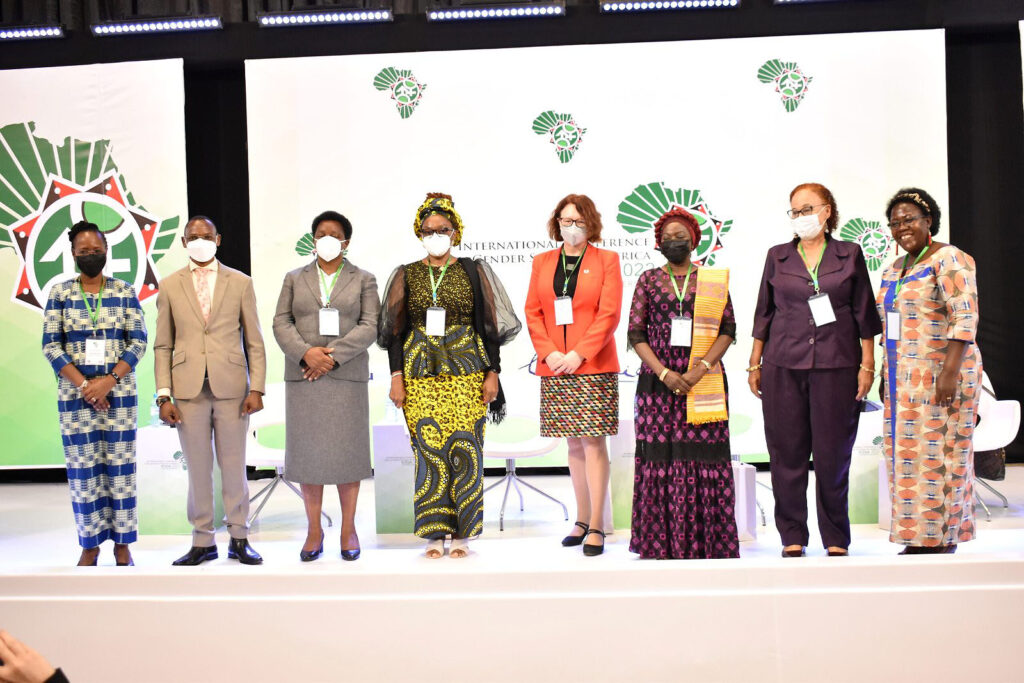
The extent of this shift was elucidated upon by the Minister of State, for Gender, Labour and Social Development, Hon. Peace Regis Mutuzo as she took part in the UN WOMEN High Level Policy Panel on Gender Studies and Practice: Lessons from the Field, held earlier on closing day.
“As we talk right now, we have 178 women in Parliament. Out of 178, 168 are elected; not just appointed but elected. And so I think we have moved a milestone. That goes to show how the Government of Uganda is committed to women empowerment, and has put in place legal and policy mechanisms for its attainment.
“The Constitution mandates the same to ensure gender balance and representation of marginalised groups on all constitutional and other bodies, guarantees women’s equal rights with men, and affirmative action to redress imbalance created by history, tradition, customs among other factors” said Hon. Mutuzo.
The UN Women High Level Policy Panel was presided over by the Deputy Vice Chancellor (Academic Affairs), Assoc. Prof. Umar Kakumba and chaired by the Principal CHUSS, Assoc. Prof. Josephine Ahikire. Other panelists included; Ms. Awa Ndiaye, UN WOMEN Representative to the African Union, Ms. Susan Ngongi Namondo, UN Resident Coordinator for Uganda, Dr. Maggie Kigozi, Chairperson of the Makerere University Endowment Fund (MakEF) who represented the Private Sector, and Hon. Bjørg Sandkjær, Deputy Minister of International Development in the Norwegian Government.
Please click the links below to view video recordings of the Closing Ceremony and UN Women High Level Panel.
Closing Ceremony: https://twitter.com/i/broadcasts/1ZkKzbnrjPaKv
UN Women High Level Policy Panel: https://twitter.com/i/broadcasts/1rmxPgbejYZJN
Downloads
You may like
-


CAES Presents Overall Best Performing Student in the Sciences & a Record 28 PhDs at the 76th Graduation Ceremony
-


Over 9,200 to graduate at Makerere University’s 76th Graduation
-


Philliph Acaye and the Making of Uganda’s Environmental Health Workforce
-


76th Graduation Highlights
-


Mak Selected to Host Alliance for African Partnership Africa Office
-


Meet Najjuka Whitney, The Girl Who Missed Law and Found Her Voice
Humanities & Social Sciences
Meet Najjuka Whitney, The Girl Who Missed Law and Found Her Voice
Published
2 days agoon
February 23, 2026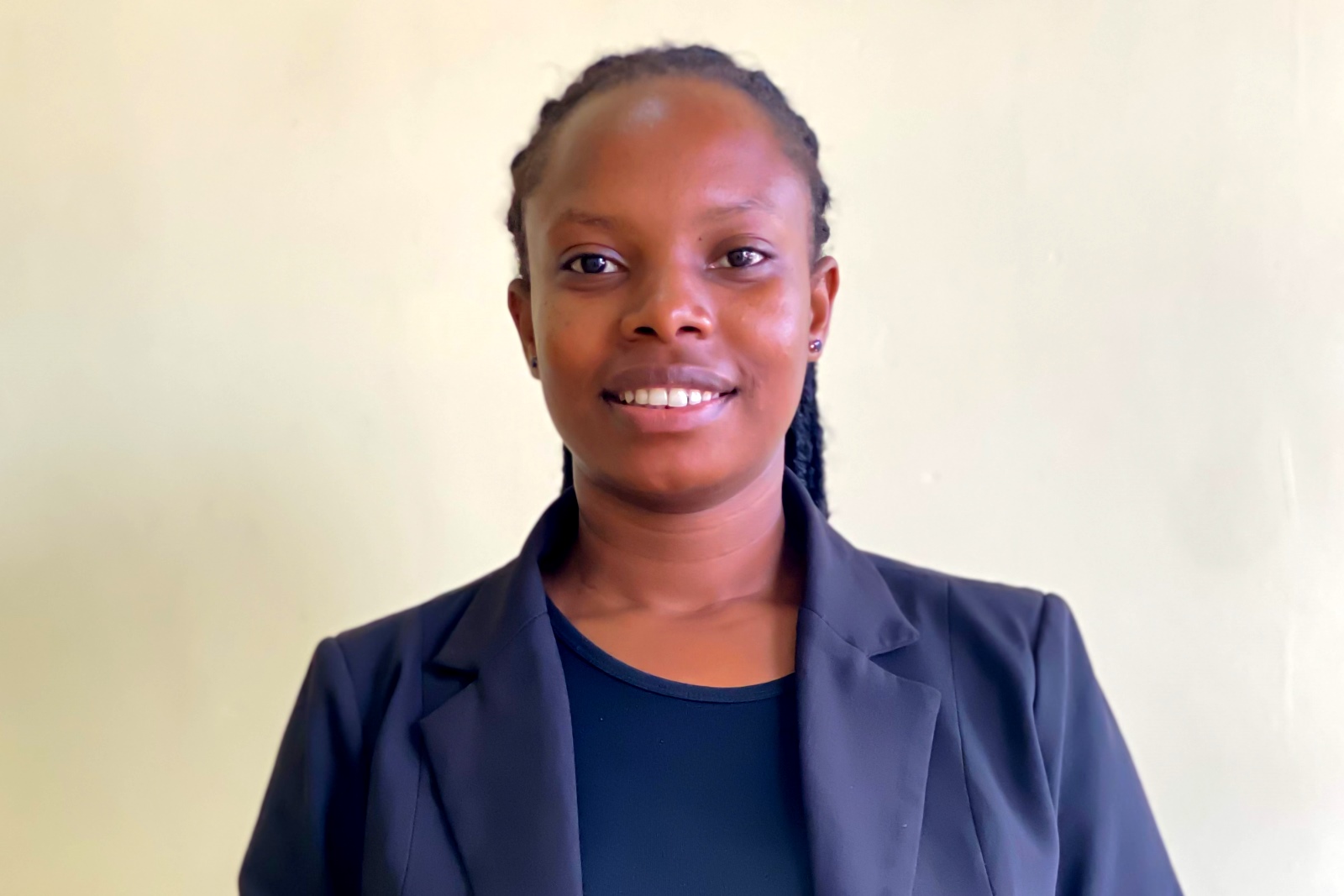
On the morning of Friday, February 27, when the academic procession winds its way across Makerere University’s Freedom Square for the last day of the 76th Graduation Ceremony, Whitney Najjuka will walk into history with a number beside her name: 4.46.
At Makerere, that number means First Class Honours. It means the Vice Chancellor’s List. It means she graduates as the only First-Class student in Journalism and Communication this year. But numbers, as Whitney has learned, rarely tell the full story.
Born on March 27, 2002, in Nabbingo, Kyengera Town Council, to Margaret Kusemererwa and Fred Kasirye, dreamt she would do Law, one of the disciplines, prestigious, almost inevitable next steps for a student who had excelled in secondary school. She had done everything correctly. Studied hard. Scored well. Followed the script.
But Makerere University had other plans. She missed the pre-entry mark, but found her name under Journalism and Communication, another prestigious course offered by the Journalism and Communication Department at Makerere University.
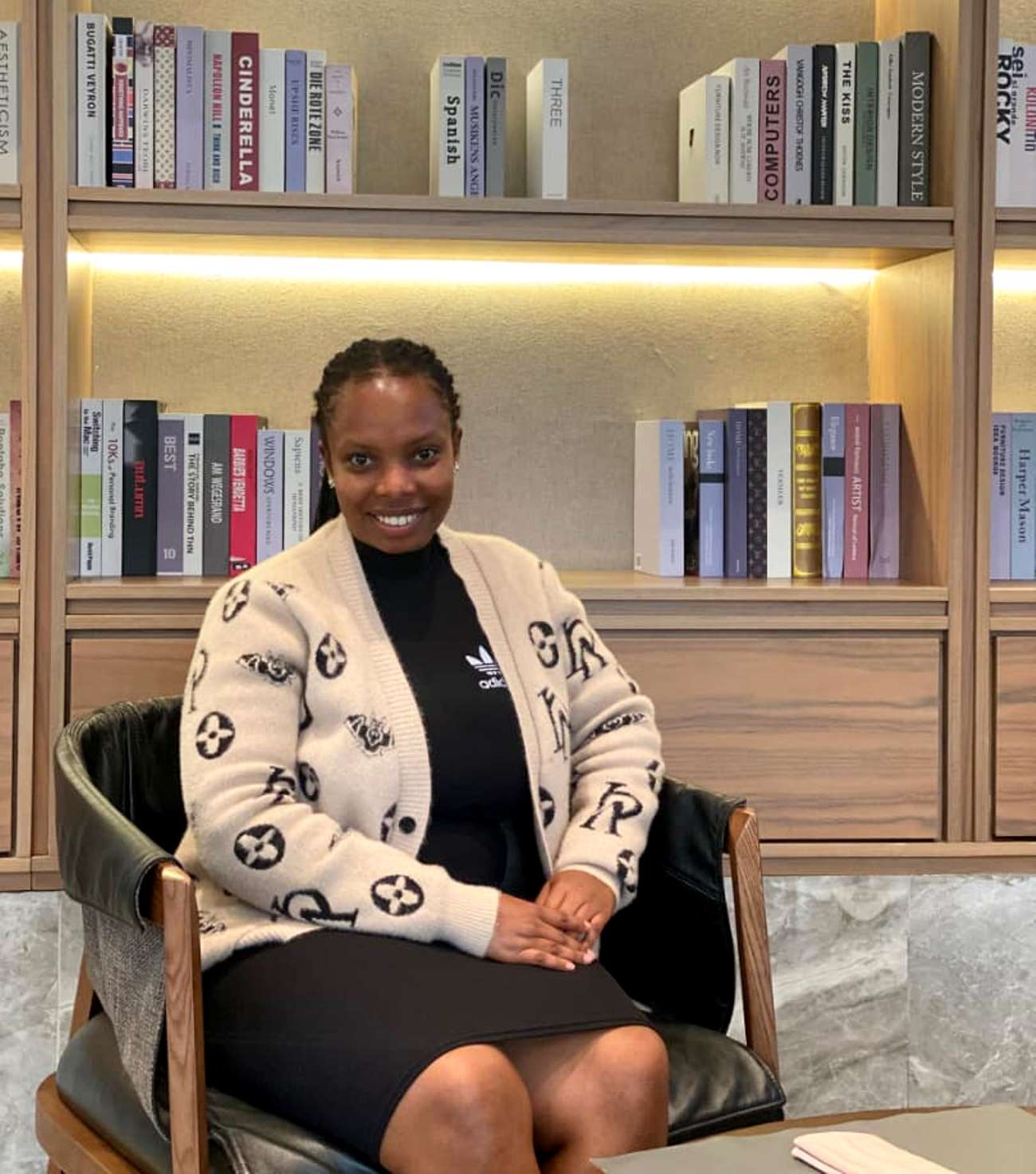
Najjuka began her academic journey at Muto Primary School in Buwama, earning 8 aggregates in the Primary Leaving Examination, a performance that positioned her strongly for secondary school.
She would later join St. Lucia Hill School, Namagoma, where she earned 20 aggregates at O-Level and 17 points in History, Luganda, and Divinity at A-Level.
Missing her dream course, Law, felt at first, like a detour. But Whitney was encouraged by Sanyu Christopher, her uncle, and she settled for a government-sponsored slot in the Bachelor of Journalism and Communication at Makerere, which she had applied for before.
She entered uncertain. But she graduates transformed.
The Pivot That Became a Purpose
Whitney speaks of her early university days with candor. She did not arrive at the Department of Journalism and Communication with a burning childhood ambition to be a journalist, but because another door had closed.
Then, Social and Behavior Change Communication happened. Applied Strategic Communication happened. She began to see media not as headlines and microphones, but as architecture, shaping how societies think, argue, and act.
The turning point came in her third year. The Female Journalist Foundation published her story on Sexual Gender-Based Violence (SGBV) and its emotional toll on survivors. What startled her was not its publication but the reaction. Comments flooded in. Debates ignited, especially about the role of men in combating GBV.
“I realized media doesn’t just report,” she says. “It frames how society views a crisis.”
Her voice, once tentative, had entered a national conversation.
The Discipline Behind 4.46
At Makerere University, a First Class CGPA is not built on brilliance alone but on ritual.
Whitney’s ritual began with showing up, on time, every time. She treated lectures as appointments with her future self. She refused to confine her learning to the syllabus. While attending workshops at the Aga Khan Graduate School of Media and Communication and obtaining external certifications, she sought and was open to mentorship through the Public Relations Association of Uganda (PRAU).
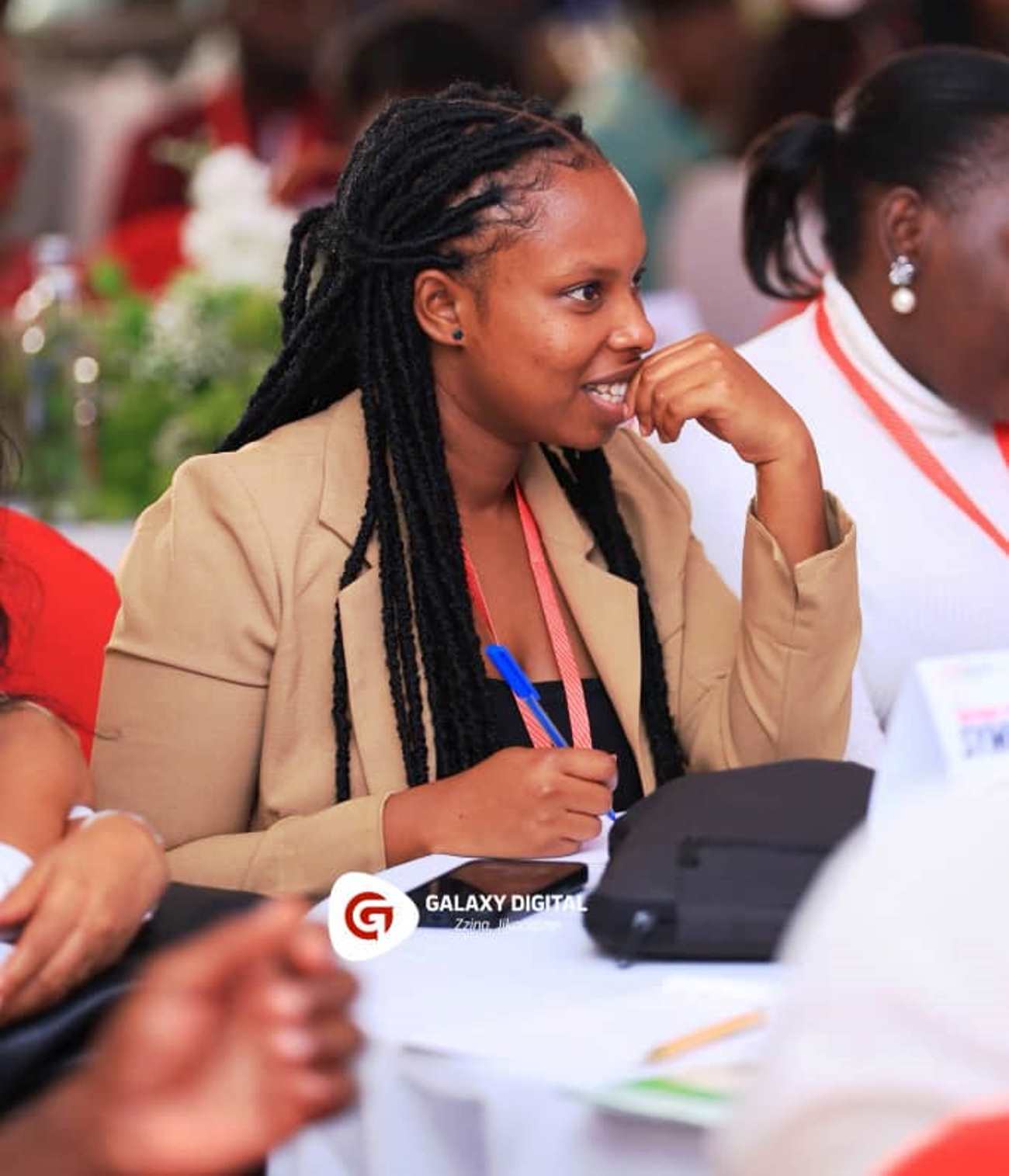
She wanted theory anchored in practice. And then there was the commute.
From Nabbingo, a hill in Wakiso District, some 18.6 km to Kampala, where the Makerere Main campus is situated, and back, nearly 20 hours a week dissolved into Kampala traffic. Two-hour journeys before 8:00 a.m. lectures. Dust. Noise. Headaches. She learned to manage energy the way others manage time. Fatigue became a tutor in resilience.
“I had to be intentional with every remaining hour,” she says. “Excuses were not an option.”
Learning to Practice Communication
If classrooms taught her analysis, presentations taught her courage. Pitching projects, defending research, and standing before peers quick to critique forced her to think on her feet. She was no longer simply studying communication; she was practicing it.
In 2024, the AGMES Fellowship at the Aga Khan Graduate School of Media and Communication pushed her further. She received funding to produce a capstone project on the mental impact of gender-based violence on survivors. She identified sources, conducted interviews, handled trauma with care, and worked with professional editors.
The Communication, she learned, is logistics and ethics as much as eloquence.
The Future She Sees
Whitney is optimistic about Uganda’s media landscape. The digital shift, she believes, has democratized influence. Young communicators are no longer confined to legacy newsrooms or offices.
Yet she sees a gap in the absence of structured research on sustainable, ethical, profitable independent media ventures in Uganda. Her ambition is not only to practice communication, but to study it. To produce data-backed frameworks that help young Ugandans transition from graduates to media entrepreneurs.
She wants to make the impact scalable.
What Remains
As the only First-Class graduate in her cohort, she is careful not to mythologize herself. “Success isn’t brilliance alone,” she says. “It’s a daily commitment when nobody is watching.”
Even before graduation, Whitney had stepped into the industry through a mentorship internship at Capital One Group (COG EA Ltd), a strategic marketing communications agency operating across East Africa.
At Capital One Group, we spoke to Paul Mwirigi Muriungi, the Managing Director and Head of Strategy, who spoke of Najjuka as a progressive and intentional young professional who approaches her work with curiosity, maturity, and responsibility.
“Her attitude is exemplary. She is teachable, receptive to feedback, and eager to grow. While technical skills can be taught, character, work ethic, and mindset determine long-term success, qualities that Whitney consistently demonstrates. Given her academic excellence and professional application, we believe she has a bright future both at Capital One Group and within the wider communications industry. She represents the kind of talent the profession needs: thoughtful, adaptable, and committed to excellence.
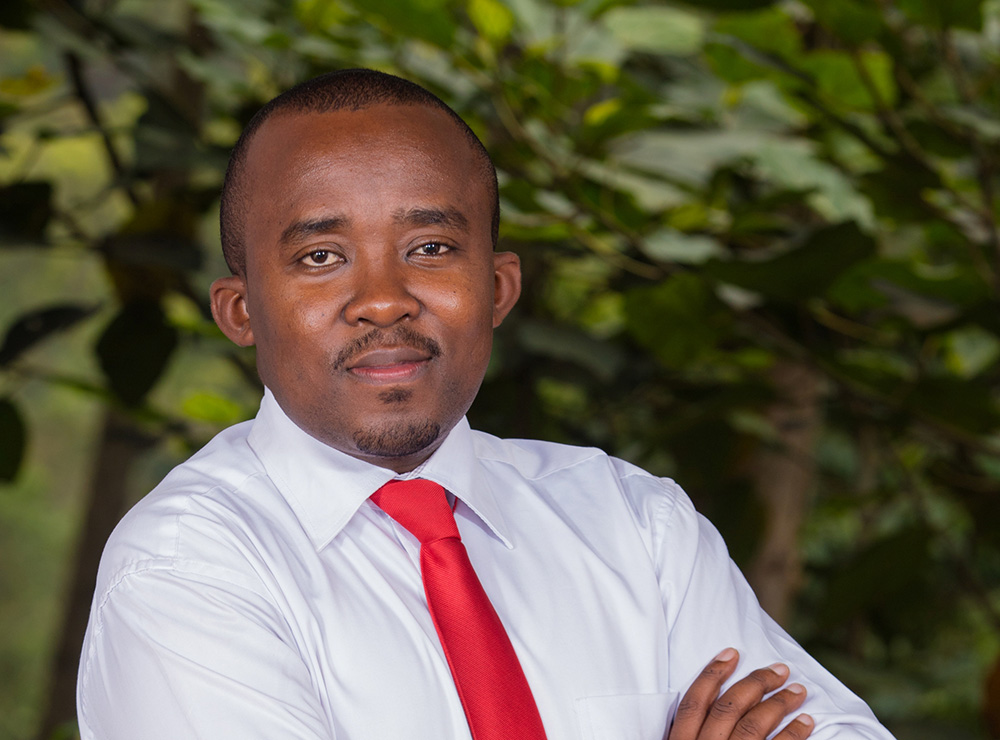
“We look forward to seeing her next chapter unfold,” says Mwirigi.
Najjuka’s gaze extends beyond her own trajectory. She speaks of what the Department could become. Furnished and equipped with industry-standard equipment, newsroom simulations, and deeper investment in data journalism as prayers. Her excellence is not self-congratulatory, but it is forward-looking.
“The University should support the Department to procure industry-standard equipment. Access to high-quality cameras, sound booths, and updated editing software like Adobe Creative Suite is critical to our learning environment,” she says.
Adding that, “We need a newsroom simulation, a physical or digital space where students work under real-time deadlines to produce content for the public. That would prepare us for industry and even strengthen the University’s own media platforms.”
In an era defined by metrics, algorithms, and digital traceability, data journalism is no longer a niche skill but a sine qua non of credible reporting. “There should also be more focus on data journalism and search engine optimization. These are no longer optional skills. Students would benefit immensely from stronger training in these areas.”
Dr. Aisha Nakiwala, the Head, Department of Journalism and Communication, says the faculty are very proud that she is graduating with a First Class—the only one in this year’s cohort.
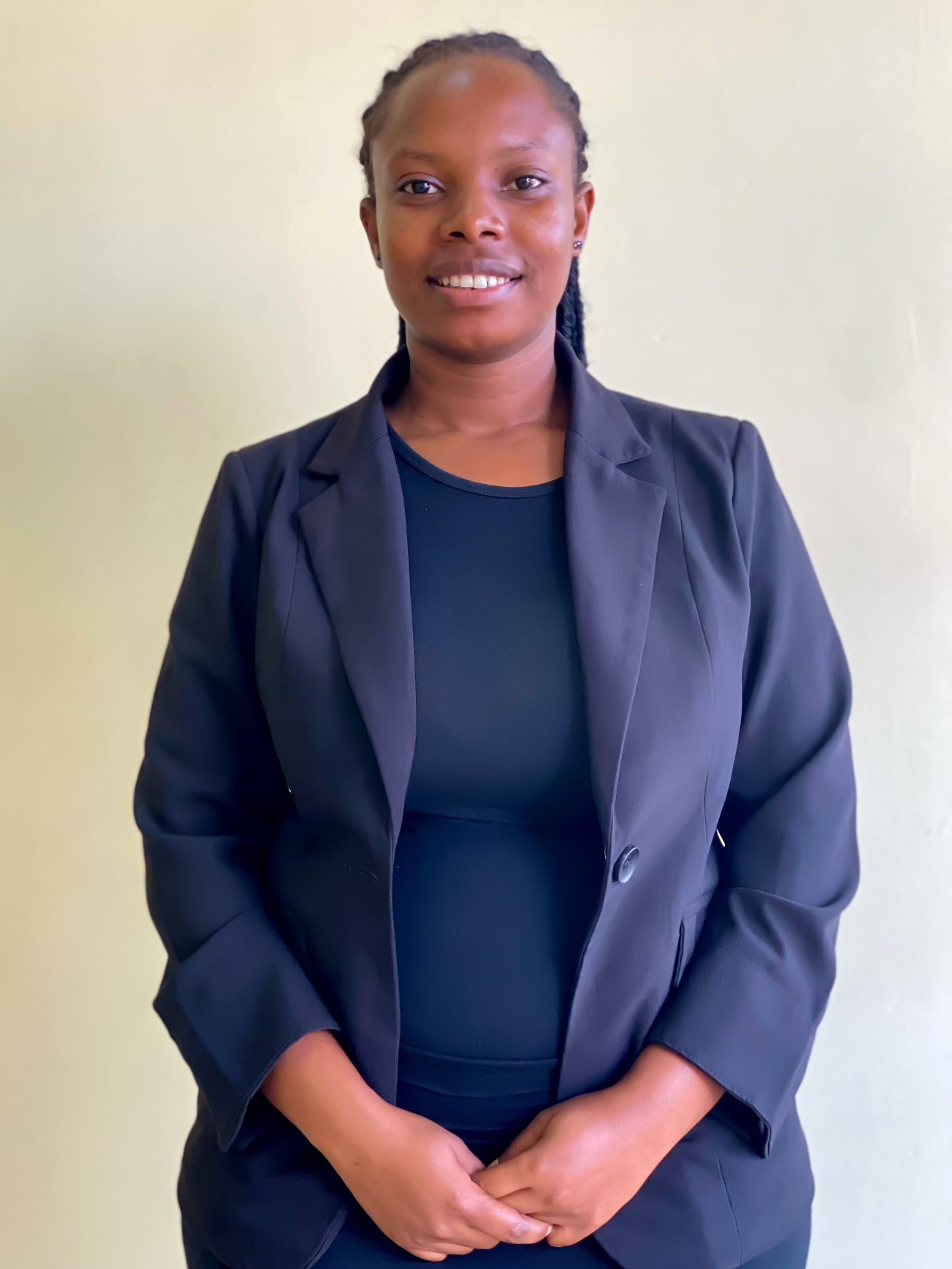
“This achievement reflects not only exceptional intellectual ability but also discipline, resilience, and sustained dedication to the highest standards over four years. Graduating with first-class honors is no small feat; it requires consistent outstanding performance.
“Her accomplishment sets a powerful example for continuing students and reaffirms our department’s commitment to nurturing excellence. We are confident she will make meaningful contributions to the communication profession and society at large,” says Dr. Nakiwala.
On graduation day, applause will crest and recede. The gowns will fold back into wardrobes. The transcripts will be filed away in cabinets. But something quieter will endure; a young woman from Nabbingo who once missed her Law mark, who spent 20 hours a week on the road, who discovered that storytelling is power, and who now walks into Freedom Square not by accident, but by intention.
Life, as she has come to understand it, lives on.
Humanities & Social Sciences
Dr. Pamela Khanakwa Honored for Steering Record 18 PhD Candidates for the Mak 2026 Graduation
Published
1 month agoon
January 23, 2026By
Jane Anyango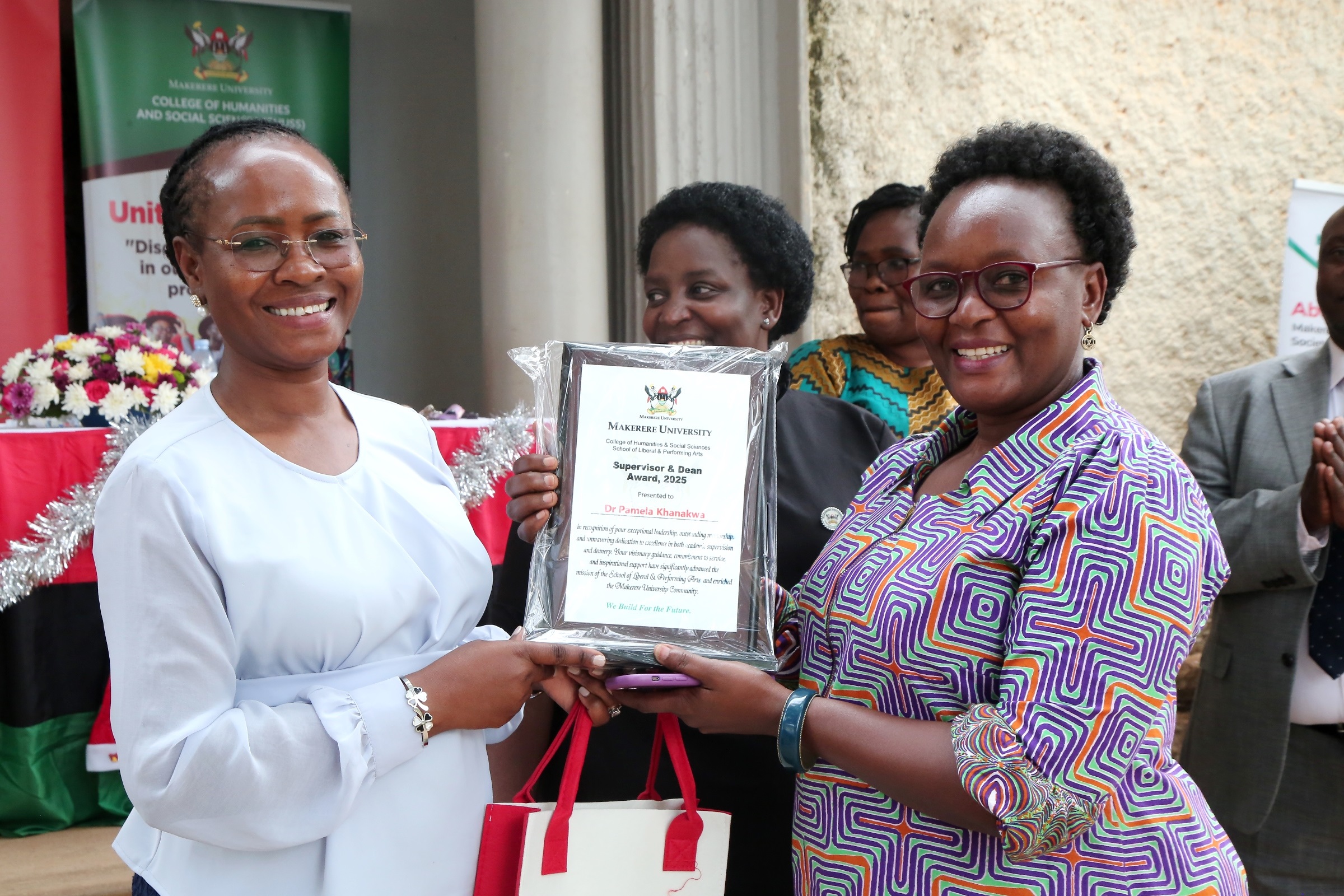
Six personally supervised, three completed in record time, as School of Liberal and Performing Arts sets a historic milestone. Dr. Pamela Khanakwa got the Award as Best PhD Supervisor and Dean
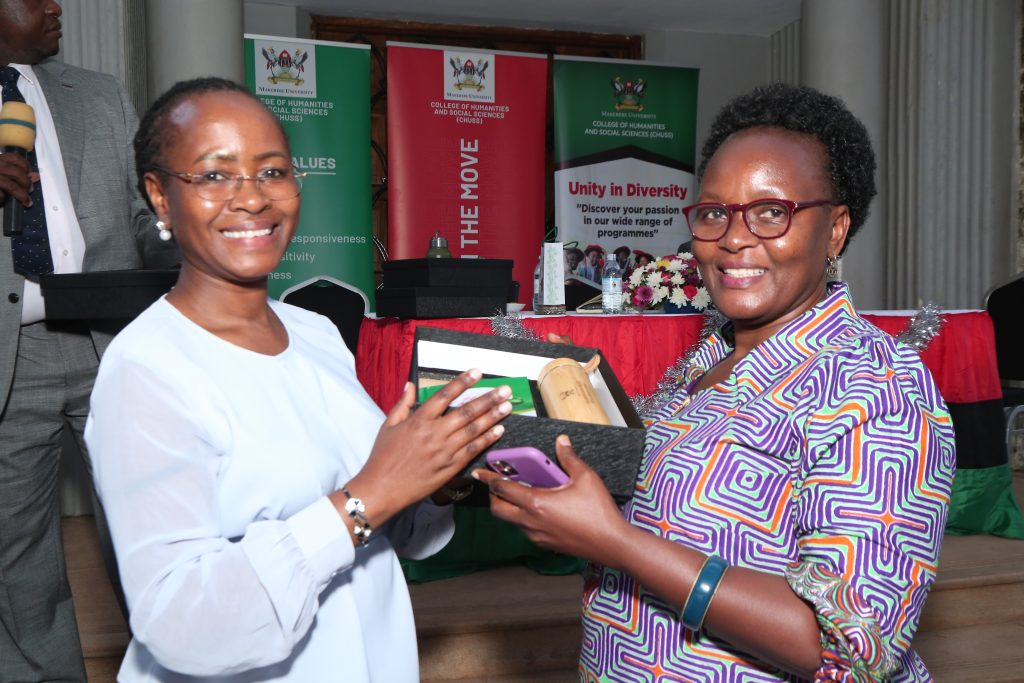
A Historic Academic Milestone for SLPA
The College of Humanities and Social Sciences (CHUSS) recognised the Dean of the School of Liberal and Performing Arts (SLPA), Dr. Pamela Khanakwa, for outstanding academic leadership that has seen the School field 18 PhD candidates for the next 2026 Makerere University Graduation Ceremony scheduled for 24th-27th February. Remarkably, six of these doctoral graduates were directly supervised by Dr. Khanakwa, with three completing within the official three-year timeframe, an exceptional achievement in graduate training. The recognition was announced during the CHUSS End-of-Year Get-Together, where staff applauded Dr. Khanakwa’s dedication, humility, and relentless commitment to postgraduate supervision and timely completion.
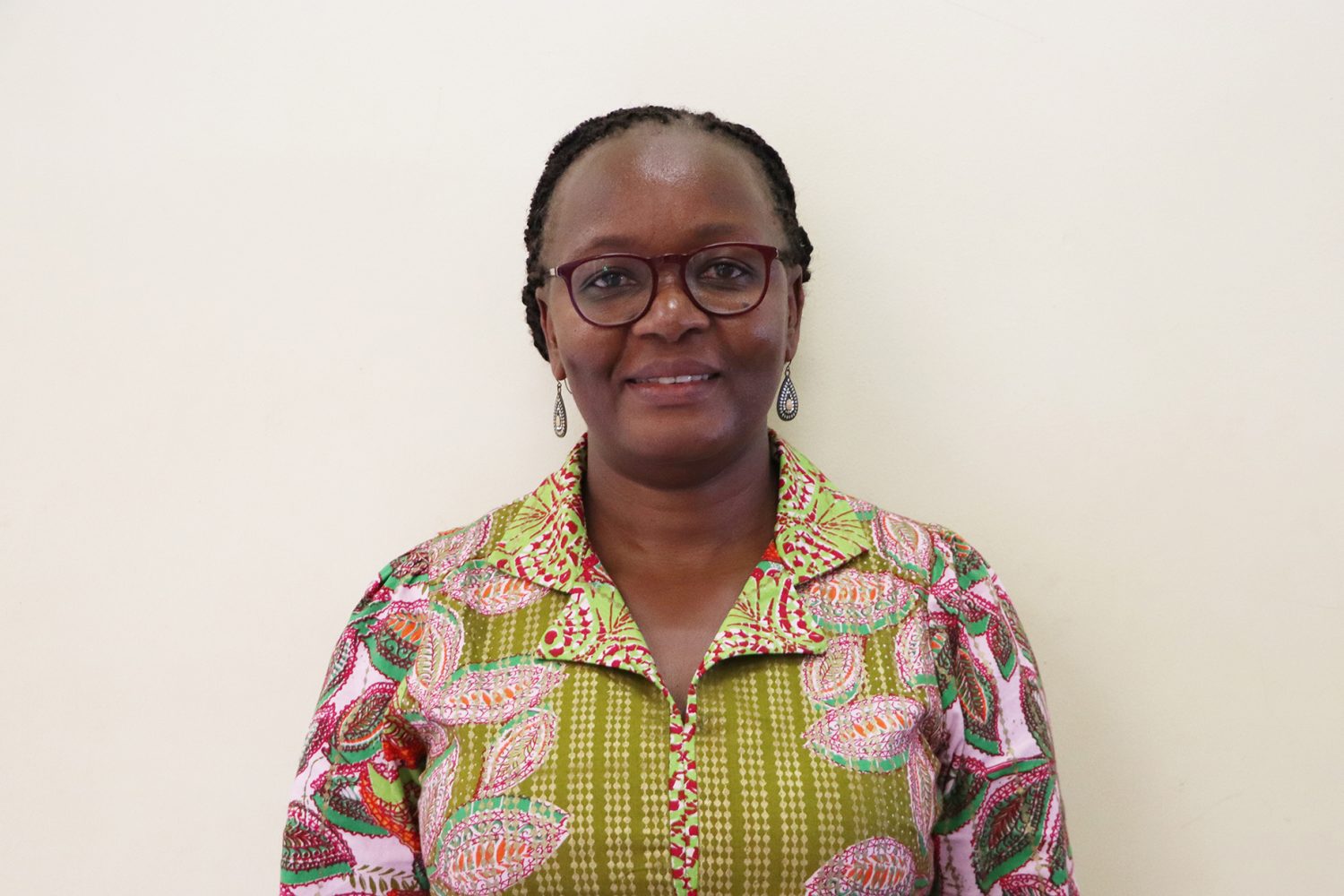
Message to Academic Staff
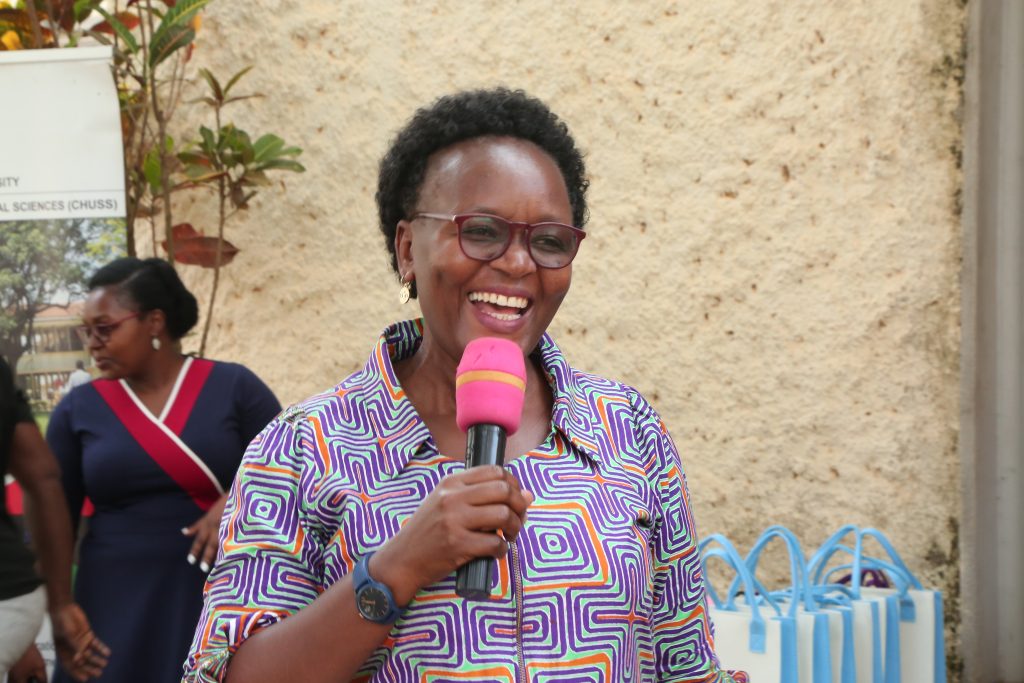
Q: What message do you have for your staff following this achievement?
Dr. Khanakwa:
First, I celebrate my staff and thank them for their dedication to supervision and student support. Academic work is demanding, and material rewards are often limited, but the true satisfaction comes from seeing students succeed.
I encourage my colleagues to remain committed. Yes, the workload is heavy, but many things are possible with dedication and teamwork. Let us continue working for the good of our students, our School, and Makerere University.
Leadership Rooted in Humility
Q: Many colleagues describe you as humble, down to earth, and hardworking. What shapes this character?
Dr. Khanakwa:
I think it is largely my upbringing. My mother was a primary school teacher from the 1950s until the mid-1980s. She worked extremely hard to raise us, combining teaching with farming to ensure we had school fees and basic needs. From her, I learned humility, discipline, and the value of hard work.
I also learned that leadership positions are temporary. You occupy them today, and tomorrow you move on. So humility is essential.
My graduate training also shaped me significantly. My PhD supervisor emphasized that graduate study is a full-time job and that results matter more than noise. Let people see your work through outcomes, not announcements.
Supervision as a Two-Way Commitment
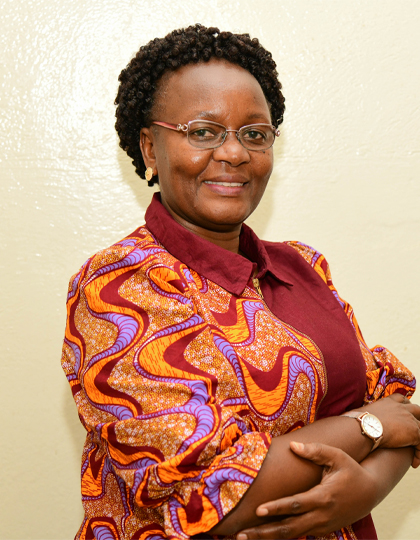
Q: How would you describe your supervision style?
Dr. Khanakwa:
I read my students’ work thoroughly, word by word. Sometimes my comments are tough, but they are honest. Supervision is a two-way commitment. I give feedback, but students must also respond and remain engaged. When that relationship works, progress happens.
Balancing Leadership, Scholarship, and Family
Q: How do you balance being a Dean, scholar, wife, mother, and daughter?
Dr. Khanakwa:
Honestly, I am not sure I balance perfectly. My mother lives far away in Bukwo, so visiting requires careful planning. My children grew up understanding the demands of academic life. I pursued my PhD in the United States and spent long periods away, but we adapted as a family.
Work has become part of my lifestyle. I use weekends to read dissertations, review manuscripts, and write. Sometimes my children ask if I ever sit without working, but this is the commitment I made. As we often say jokingly, “We humbly applied for the job, so let us do the job.”
Scholarship Beyond Supervision
Dr. Khanakwa is also an active scholar and editor. In the past year alone, she has:
- Edited scholarly volumes on archives, memory, method, and pedagogy
- Published a book with Routledge Companion
- Co-authored journal articles and book chapters with graduating students, including Priscah Asiimwe and Anatoli Lwasa Mpijja
“I feel an obligation to write with students,” she notes. “It takes time, energy, and commitment, but it is part of academic mentorship.”
Who Is Dr. Pamela Khanakwa?
Dr. Pamela Khanakwa is the Dean, School of Liberal and Performing Arts, College of Humanities and Social Sciences, Makerere University. She is a seasoned scholar, supervisor, administrator, and mentor whose leadership continues to redefine graduate training excellence. Details about Dr. Pamela Khanakwa can be accessed at: https://chuss.mak.ac.ug/en/personnel/pamela-khanakwa/
More details are available in her attached curriculum vitae.
The CHUSS End- Of-Year-Get-Together
On 12th December, 2025 the college leadership organised a get-together end of year gathering to take stock of the achievements, challenges and brainstorm together on how to move forward. The event was marked by entertainment, team building games, appreciation speeches, sharing a meal and a Christmas package for every staff
Retirees and staff recognised
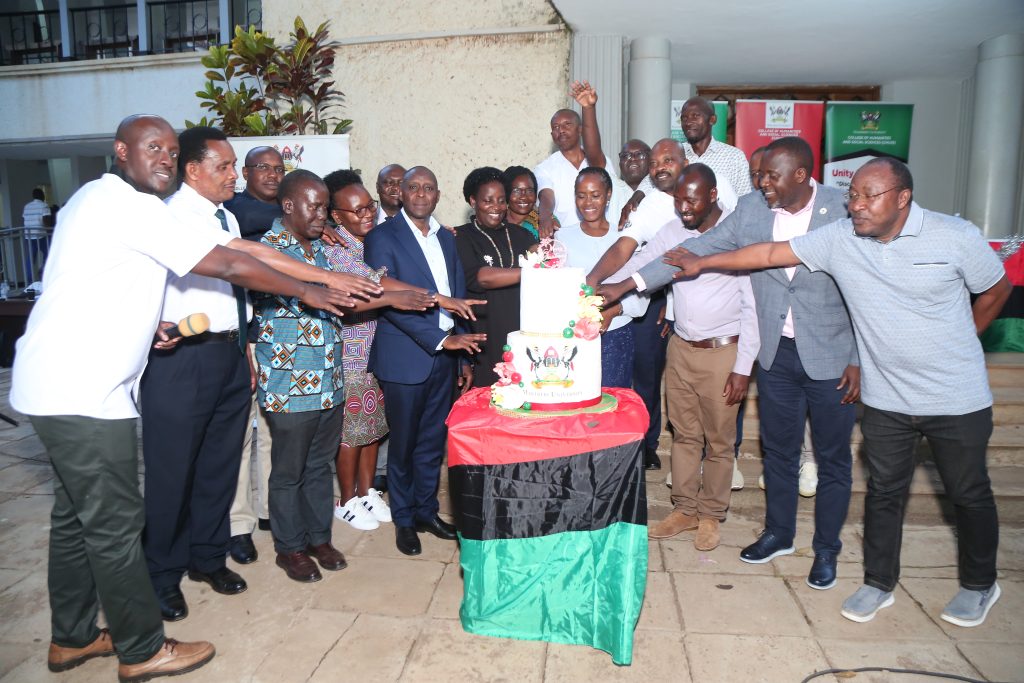
Five retired staff Dr. Micheal Wangotta Masakala, Dr. Anatole Kirigwajjo and Dr. Jackson Kizza Mukas (all from the School of Languages, Literature and Communication), Assoc. Prof. Florence Nansubuga (School of Psychology), Dr. Tusabe Gervase (School of Liberal and Perforing Arts) and Ms. Scovia Nganda Sekweyama (secretary from the School of Social Sciences) were recognised for their dedicated services to the university.
In addition to Dr. Pamela Khanakwa’s Award as Best PhD Supervisor and Dean, Ms. Birabwa Florence scooped the award of Best Registrar of the year. Birabwa is the registrar for the School of Liberal and Performing Arts.
Administrative and support staff including Ms. Mary Gyezaho and Annet Kashumbusha(both administrative secretaries in the Principals office), Farouq Lule (IT Officer), Godfrey Kakooza (cleaner), Charles Sebuguzi (driver) and Jane Anyango (Communications officer) were recognise with awards for outstanding service. Dr. Mohamed Mayanja Kajumba was from the School of Pyschology was recognised as the person with an outstanding talent in Handwriting.
The celebrations held in the Arts quadrangle were graced by the Vice Chancellor Academic Affairs Prof. Sarah Ssali and the Deputy Vice Chancellor in charge of Finance and Adminstration Prof. Ireeta Tumps.
Humanities & Social Sciences
Ugandan Journalists Trained on Peace and Gender-Sensitive Reporting Ahead of 2026 Elections
Published
2 months agoon
January 9, 2026By
Jane Anyango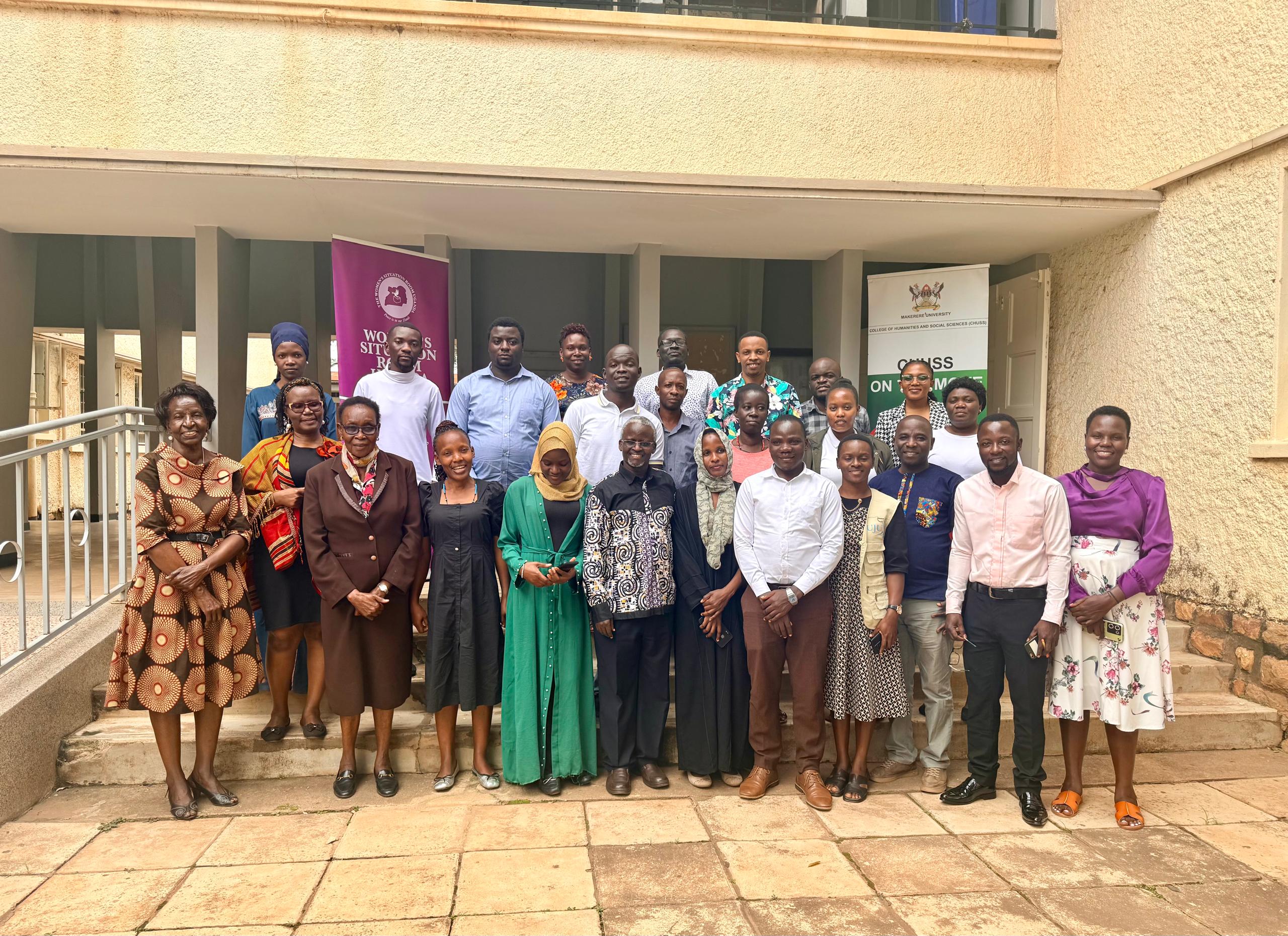
Kampala, Uganda – January 9, 2026
Ahead of the January 15 general elections, Ugandan journalists have undergone specialized training on peace and gender-sensitive reporting to ensure responsible media coverage during the election period. The two-day training, held from 8th to 9th January 2026 at Makerere University’s College of Humanities and Social Sciences Smart Room, was organized by the Women’s Situation Room (WSR) in partnership with various stakeholders and brought together journalists from across print, broadcast, and online platforms.
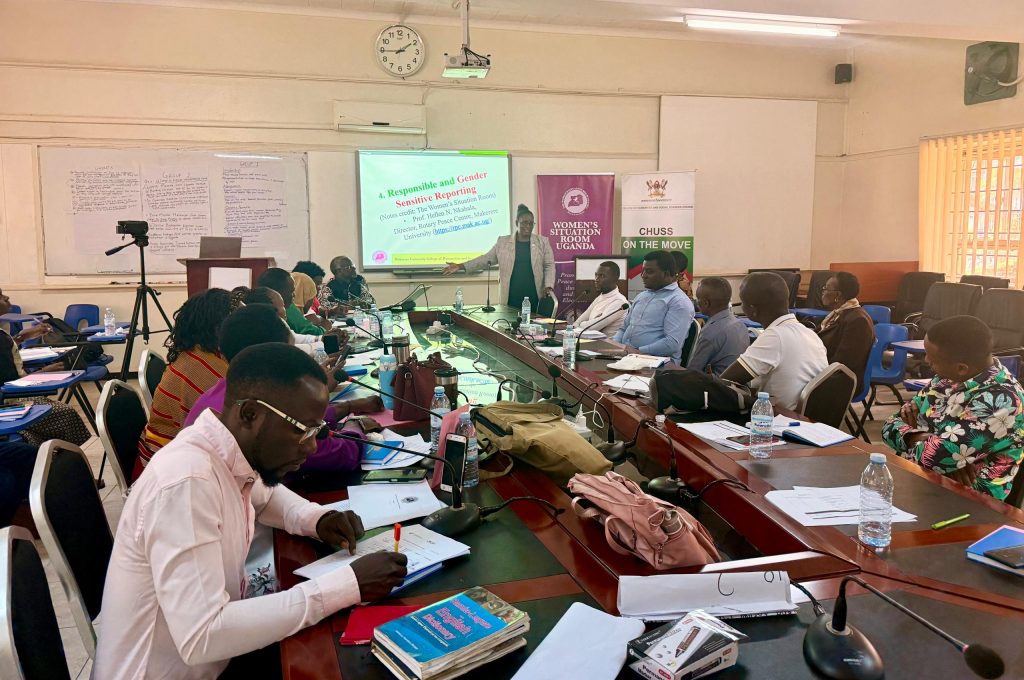
The main objective of the training was to strengthen the capacities of media in reporting and documenting electoral processes in a responsible and gender-sensitive manner. The specific objectives included: strengthening journalists’ skills to cover the 2026 elections in a fair, balanced, gender-sensitive, and non-violent partisan way; enhancing the role of media to enable citizens to be well-informed and actively participate in the election process; ensuring focused and balanced reporting on peace during and after elections; and strengthening partnerships between the WSR and media houses during the election period.
The training covered multiple critical modules. Day one focused on responsible conflict-sensitive reporting, emphasizing principles such as balance, impartiality, and accuracy. Participants explored the role of media as a relayer of the population’s voice, election monitor, catalyst for social cohesion and reconciliation, contributor to the accountability of political actors, and a platform for detecting and debunking digital media misinformation and hate speech.
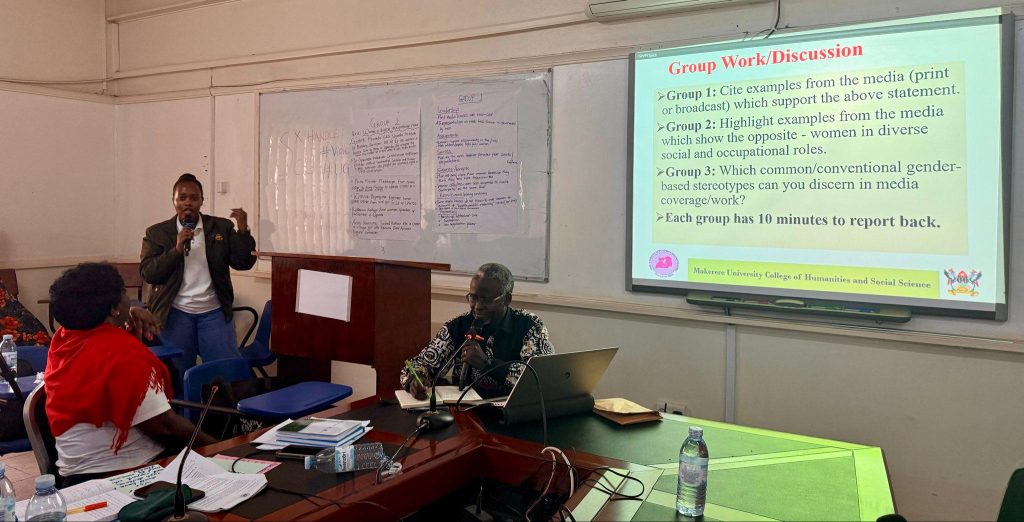
Day two addressed responsible and gender-sensitive reporting. Key aspects included the definition of gender-sensitive reporting, how to become a gender-sensitive reporter, critical elements in reporting with gender awareness, packaging gender-sensitive stories, and a checklist for detecting and avoiding gender-insensitive reporting.
Her Lordship, retired Judge Justice Mary Mayitum, emphasized the importance of peace as the foundation of development and democratic engagement. “Because we value peace more than anything. Without peace, really, you can do nothing. But where there is peace, you can have time to reflect, discuss with others, and join in meaningful dialogue,” she said. She warned that the country’s past conflicts, such as those in Gulu, underscored the necessity of maintaining national harmony.
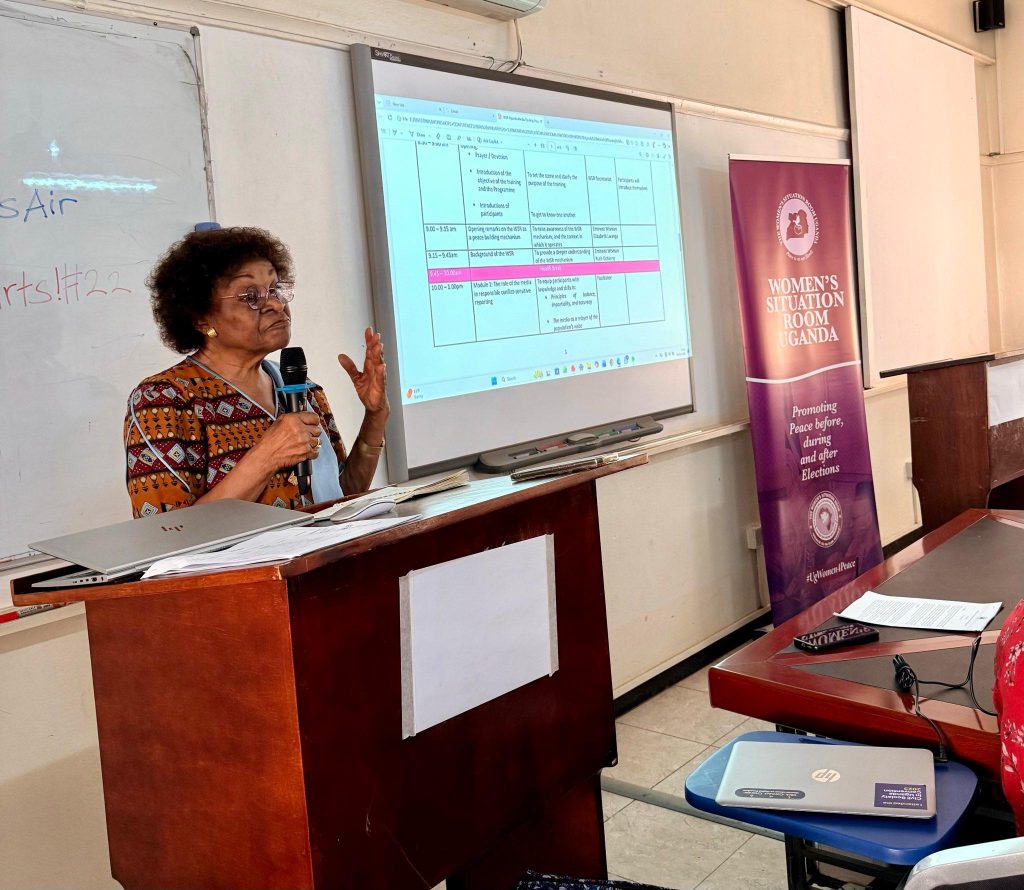
Justice Mayitum also urged other key election stakeholders to uphold peaceful conduct. “Being peaceful is the very heart of life. We have spoken to police, security personnel, political parties, and the Electoral Commission. We want politicians to have a code of conduct and to understand that it’s okay to think differently without fighting or hating one another,” she added.
Dr. William Tayebwa, lead facilitator and senior lecturer in the Department of Journalism and Communication at Makerere University, said, “This training is about conflict-sensitive reporting, peace journalism, and gender-sensitive reporting in the context of the elections. The emphasis was on giving female political candidates a voice while ensuring journalists report responsibly on election-related matters.”
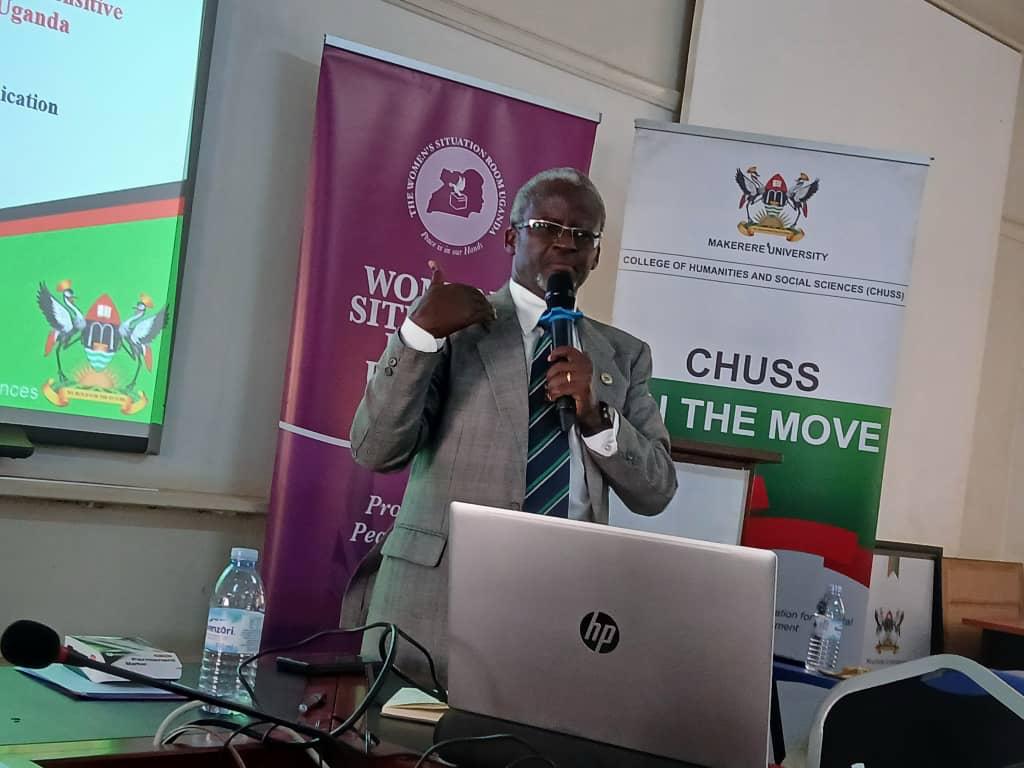
Participants described the training as timely and impactful. Tony Banizengabo of CBS Wakiso District said, “We’ve benefited a lot. We’ve been trained to write stories which bring peace, not conflict. Ahead of the elections, we are very ready to be part of peacemakers.”
Dorcas Kimono of UBC TV Kampala added, “It was so timely and rich. We learned how to report without promoting or fueling violence, giving voice to victims without angering them or encouraging violators. This is very vital, especially as we approach the 2026 elections.”
The training aims to equip media personnel with the knowledge and skills to uphold professional ethics while contributing to a peaceful, inclusive, and gender-sensitive electoral process.
Trending
-

 Humanities & Social Sciences2 days ago
Humanities & Social Sciences2 days agoMeet Najjuka Whitney, The Girl Who Missed Law and Found Her Voice
-

 Health1 week ago
Health1 week agoUganda has until 2030 to end Open Defecation as Ntaro’s PhD Examines Kabale’s Progress
-

 Agriculture & Environment5 days ago
Agriculture & Environment5 days agoUganda Martyrs Namugongo Students Turn Organic Waste into Soap in an Innovative School Project on Sustainable Waste Management
-

 General1 week ago
General1 week agoMastercard Foundation Scholars embrace and honour their rich cultural diversity
-

 Health2 weeks ago
Health2 weeks agoCall for Applications: Short Course in Molecular Diagnostics March 2026
